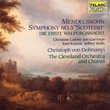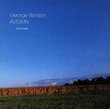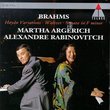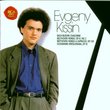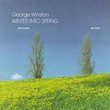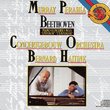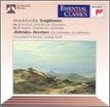| All Artists: Thomas Quasthoff Title: Brahms, Liszt: Lieder Members Wishing: 0 Total Copies: 1 Label: Deutsche Grammophon Release Date: 2/8/2000 Genres: Pop, Classical Styles: Vocal Pop, Opera & Classical Vocal Number of Discs: 1 SwapaCD Credits: 1 UPC: 028946318324 |
Search - Thomas Quasthoff :: Brahms, Liszt: Lieder
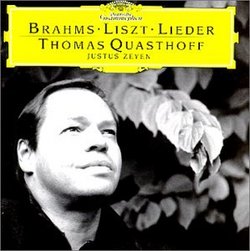 | Thomas Quasthoff Brahms, Liszt: Lieder Genres: Pop, Classical
This is an extraordinary record; the emotional impact, both of the music and the performance, is almost overwhelming. Thomas Quasthoff's voice is uniquely, incomparably beautiful, unfailingly pure, dark and warm as velve... more » ![header=[] body=[This CD is available to be requested as disc only.]](/images/attributes/disc.png?v=a4e11020) ![header=[] body=[This CD is available to be requested with the disc and back insert.]](/images/attributes/disc_back.png?v=a4e11020) ![header=[] body=[This CD is available to be requested with the disc and front insert.]](/images/attributes/disc_front.png?v=a4e11020) ![header=[] body=[This CD is available to be requested with the disc, front and back inserts.]](/images/attributes/disc_front_back.png?v=a4e11020) |
Larger Image |
CD DetailsSynopsis
Amazon.com This is an extraordinary record; the emotional impact, both of the music and the performance, is almost overwhelming. Thomas Quasthoff's voice is uniquely, incomparably beautiful, unfailingly pure, dark and warm as velvet. His breath is endless, while his range of dynamics, color, and inflection seems infinite. Quasthoff's diction is clear, and he melds words and music to reach into the heart of every song, drawing the listener into the changing moods with riveting intensity, but also with the utmost simplicity and immediacy of expression. The 19 Brahms songs are grouped by opus numbers. Most are relatively unfamiliar and, with a few exceptions, somber and gloomy; Quasthoff brings out their melancholy, tenderness, yearning, despair, remorse, and turbulence, creating shades of darkness with vocal and musical subtlety. Liszt's Three Petrarca Sonnets are miniature Italian operas, with dramatic recitatives and meltingly lyrical, romantic arias. The piano introductions and interludes are true Lisztian virtuoso pieces. They are sung and played by pianist Justus Zeyen to the hilt but without histrionics. Then comes the surprise: a lovely ballad on the famous poem "The Lorelei," and a touching love song that later became the famous "Liebestraum." The program ends with another beautiful, serene love song. --Edith Eisler Similarly Requested CDs
|
CD ReviewsQuasthoff in mostly melancholy vein klavierspiel | TX, USA | 06/20/2001 (4 out of 5 stars) "Thomas Quasthoff and pianist Justus Zeyen, a sensitive duo partner, offer an interesting collection of songs by two composers of the late nineteenth century who were diametrically opposed in aesthetic sensibility. Quasthoff is on the upside of a major career and this CD supplies clear evidence why: his warm, darkly expressive baritone falls easily on the ear, but he is much more than a beautiful voice--his clear diction and attention to words brings the mostly slow and melancholy music to life. That being said, the preponderance of dark moods on this disc is a bit too much of a good thing--the overall impression is slightly monotonous, through no fault of the performers. It may be noted that the version of the Petrarch Sonnets Quasthoff performs on this album is not Liszt's own rendering for baritone, but the earlier, more vocally spectacular version originally conceived for a tenor voice, transposed downward." Dramatic klavierspiel | 04/03/2000 (3 out of 5 stars) "Though new to lieders and Quasthoff, I find myself thinking of these songs while at work. The lieders that play in my mind throughout the day are Brahms' Lieder und Gesange, op. 32. Specifically, "Bitteres zu sagen denkst du" as well as, "Wie bist du, meine Konigin". Justus Zeyen's piano lends beautifully to the haunting quality of Quasthoff's amazing voice. He makes me wonder if this is how angels might sound. For me, these two songs alone, are worth the price of admission." Look, I'm not a singer but how this qualifies as good singin jt52 | New Jersey | 08/16/2007 (2 out of 5 stars) "is just beyond me. Quasthoff has problems with pitch focus (it often takes concentration to determine what exact pitch he is singing), his functional range strikes me as pretty small (he spends a lot of time in upper and lower registers which have very different timbres than the middle range and his problems only intensify in these registers) AND he is a worse-than-mediocre interpreter - his shaping of the melodies he sings are befuddling and amorphuous.
The Liszt Sonnets are held together by Quasthoff's wonderful pianist, Justus Zeyen, with Quasthoff muddying the waters with confused phrasing and fuzzy pitch focus. I was initially so puzzled with this CD that I did a back-to-back comparison of Brahms' "Sapphic Ode" (op. 94/4) as performed by Jessye Norman. Norman has a beautiful and sonorous voice and incredible presence, but she is not normally thought of as an exceptional interpreter. Well, she manages to make the Sapphic Ode into a comprehensible song with a melody that can be followed. Can't say the same for Quasthoff, who mangles it beyond recognition. So the vocal interpretation and musicianship on this disc are simply bad. This is unfortunate because the repertory is unusual and is grouped nicely. I'll repeat the Zeyen is wonderful -- too bad I can't extend that to Quasthoff." |

 Track Listings (25) - Disc #1
Track Listings (25) - Disc #1
